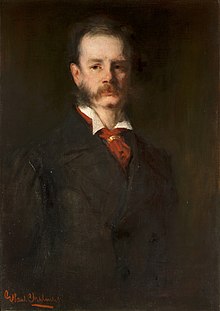John Batty Tuke
| John Batty Tuke | |
|---|---|
 |
|
| Born |
9 January 1835 Beverley, England |
| Died | 13 October 1913 (aged 78) Edinburgh, Scotland |
| Residence | Scotland |
| Nationality | British |
| Fields | Neuroscience |
| Alma mater | University of Edinburgh |
| Known for | puerpural insanity, MP, President of the Royal College of Physicians of Edinburgh |
| Notable awards | Honorary D.Sc. Trinity College, Dublin, Knighthood |
Sir John Batty Tuke (9 January 1835 – 13 October 1913) was one of the most influential psychiatrists in Scotland in the late nineteenth century, and a Unionist Member of Parliament (MP) from 1900 to 1910. Tuke’s career in Edinburgh from 1863 to 1910 spanned a period of significant social and political changes in asylum governance and care in Scotland. Tuke’s professional success in public and private practice and his powerful role in several prominent medical societies allowed him to influence his colleagues toward a more physiological understanding of mental illness and its treatment.
Batty Tuke (as he is most often referenced) was born in Beverley, England in 1835. Although the details of his father’s heritage are not known, articles about Batty Tuke link him to the famous Tuke family that founded the York Retreat. In 1845 Tuke was sent to Edinburgh where he began attending the newly opened Edinburgh Academy. He graduated with honours in history and reading in 1851. Tuke went on study at the Edinburgh University Medical School where he graduated in 1856 and was registered at the Royal College of Surgeons of Edinburgh. Shortly after qualifying Tuke went to New Zealand as a medical surgeon for seven years in the Maori War.
Upon his return to Edinburgh in 1863 Tuke was appointed to the Royal Edinburgh Asylum (later renamed the Royal Edinburgh Hospital) as an assistant physician. Under the tutelage of the then superintendent David Skae Tuke quickly developed a niche in puerperal insanity and published influential articles on the subject. In 1865 Tuke's reputation was confirmed with an appointment to the newly built Fife & Kinross District Asylum (now Stratheden Hospital) as superintendent. There he had the ability to hire and train his entire staff and set out an "open-doors" model of care for his patients which gained him further accolades from his peers. While Tuke was working in this influential position, his publications began especially to promote his ideas for the advancement of humane patient treatment.
As his career progressed Tuke also occupied positions of leadership within the Royal College of Physicians of Edinburgh and wrote an influential article on the "cottage system" of care for insane people where he criticised the traditional Scottish practices of caring for "incurable" insane people by boarding them out with often destitute members of the community in exchange for meager compensation. In 1873 Tuke returned to Edinburgh to take a joint management position with Dr Smith and Dr Lowe at the private Saughton Hall Asylum. This move marked a change from public to private care and Tuke also set up a practice in Charlotte Square as a “specialist in mental diseases.” That year, he was appointed to be Morison Lecturer at the RCPE for 1874, and began teaching at the University of Edinburgh. Another notable achievement during this time was his contribution to the ninth edition of the Encyclopædia Britannica. Considered to be the most 'scholarly' edition produced by this publisher Tuke wrote the entries on hysteria and insanity. Tuke also contributed to a series of “Health Lectures for the People” delivered in Edinburgh during the winter of 1881–2. His lectures on “The Brain and its Functions” debunked the science of phrenology and used visual demonstrations to teach the public about the brain.
...
Wikipedia
